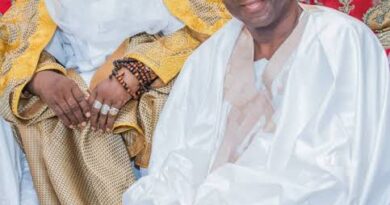Now That Tinubu Has Listened …
Now That Tinubu Has Listened …
By Alabidun Shuaib AbdulRahman
When President Bola Ahmed Tinubu announced, earlier in October 2025, that 175 individuals had been granted state pardon, clemency, or commutation of sentences, the news was framed as an act of justice, compassion, and correction. It was meant to mark a milestone in the President’s promise of a “renewed hope” administration, one that tempers justice with mercy, and offers a second chance to the reformed.
But in the days that followed, that noble gesture swiftly morphed into a national debate. The backlash was intense, the criticisms unrelenting, and the public mood unmistakably angry. What began as a constitutional exercise soon appeared, to many Nigerians, as a moral misjudgment. And by the end of October, the President was forced to reverse parts of the decision, trimming the list, clarifying the scope, and pledging a review of the process.
Now that Tinubu has listened, the question that must be asked is: What has he really done? And more importantly, what has the entire episode revealed about power, public trust, and governance in Nigeria?
Interestingly, the presidential clemency, announced on October 12, came through the Ministry of Justice and covered 175 individuals across various categories, including pardons, commutations, and reprieves. The list, compiled by the Presidential Advisory Committee on the Prerogative of Mercy (PACPM), included a mix of convicts serving jail terms for drug trafficking, illegal mining, fraud, and violent crimes, alongside some posthumous pardons for historical figures such as nationalist Sir Herbert Macaulay and military officer Major-General Mamman Jiya Vatsa.
READ ALSO: The Coup That Dare Not Speak Its Name, by Farooq A. Kperogi
The official statement from the Presidency said the exercise aimed to “decongest correctional facilities and promote restorative justice,” in line with Section 175 of the 1999 Constitution. It added that the beneficiaries were selected after “due consideration of factors such as age, ill health, good conduct, and evidence of reformation.”
But almost immediately, Nigerians began to ask: Who decides what qualifies as reformation? Were victims consulted? And how do you justify extending clemency to persons convicted of drug-related and violent crimes in a country still reeling under the weight of insecurity, substance abuse, and moral decline?
Social media erupted in outrage. Civil society groups issued statements condemning the exercise as tone-deaf and insensitive. Legal experts questioned the criteria used. Families of victims expressed disbelief that individuals convicted of offences like armed robbery and homicide could be released or have their sentences reduced without public consultation. The backlash was swift and brutal.
In a nation, moral-wise, already struggling with eroded trust in institutions, Tinubu’s clemency decision struck a nerve. Critics argued that mercy, though constitutional, must not be exercised in a way that undermines justice or public confidence.
For many Nigerians, the pardon list symbolised the very thing they feared about governance, a system that protects the powerful while ignoring victims.
Several high-profile inclusions stirred the controversy. Among those initially listed were convicts serving long sentences for drug trafficking, one for cocaine importation, and another for illegal mining, crimes that continue to destabilise communities and the economy. The perception was that Tinubu’s clemency ignored the gravity of the offences and the broader social harm they caused.
Public intellectuals and editorial boards joined the fray. The Punch editorial of October 24th described the move as “reckless leniency,” arguing that it “trivialises justice and weakens deterrence.” Others accused the government of seeking cheap populism through arbitrary mercy.
Facing a public rage, President Tinubu’s team scrambled to regain control of the narrative. On October 29, just over two weeks after the initial announcement, the Presidency issued a revised statement.
The revised list, according to The Cable and Channels TV, was trimmed from 175 names to about 120. Persons convicted of serious crimes, including kidnapping, armed robbery, human trafficking, large-scale drug trafficking, and unlawful possession of firearms were either removed entirely or had their full pardons converted into partial sentence reductions.
The Presidency clarified that the revision followed “a fresh security and legal review” by the Attorney-General of the Federation and that the decision was taken “to be sensitive to the feelings of victims and society at large.”
It was also announced that the Secretariat of the Presidential Advisory Committee on the Prerogative of Mercy would henceforth operate under the Federal Ministry of Justice, rather than the Office of the Secretary to the Government of the Federation, to ensure “greater legal oversight and due process.”
While the reversal calmed the outrage, it raised deeper questions about the integrity of governance processes. How did such a controversial list pass through layers of bureaucratic scrutiny before reaching the President’s desk? And why did it take public uproar for corrections to be made? Tinubu’s reversal, though commendable, underscored a reactive style of governance that bends to outrage rather than pre-empting it through consultation and moral foresight.
In fairness, listening to public sentiment is not weakness, it is a democratic strength. Tinubu deserves credit for acknowledging the outcry and acting promptly. But the larger issue is systemic. The episode exposed the opaque nature of Nigeria’s clemency system. The Presidential Advisory Committee on the Prerogative of Mercy operates largely behind closed doors, with minimal public oversight. There is no clear national framework defining who qualifies for mercy, how victims’ perspectives are integrated, or what accountability measures follow a pardon.
In contrast, countries like South Africa, Ghana, and Kenya have more transparent systems. In South Africa, for instance, clemency applications are published publicly, judicial advice is sought, and reasons for each decision are documented. These procedures protect both the President and the public from perceptions of bias or impunity. Nigeria lacks such guardrails, leaving presidential mercy vulnerable to political manipulation or poor judgment.
If Tinubu truly wishes to turn this episode into a learning moment, the next step must be institutional reform. A National Clemency Policy should be developed under the Ministry of Justice, detailing eligibility criteria, consultation procedures, and exclusions. Certain crimes such as terrorism, kidnapping, rape, large-scale corruption, murder, drug-trafficking and violent offences should be explicitly barred from pardon. Victims’ rights should also be central to the process, ensuring that their pain is neither ignored nor overridden by political convenience.
Moreover, post-pardon monitoring should be introduced to ensure that beneficiaries truly reintegrate into society as reformed citizens. Without such mechanisms, clemency risks becoming a revolving door for repeat offenders, weakening public trust and emboldening criminality. Mercy, when detached from accountability, is indistinguishable from impunity.
The deeper implication of Tinubu’s reversal lies in what it says about public trust. Nigerians are weary of governance that appears tone-deaf to moral and social realities. Every decision that seems to favour the powerful or the undeserving erodes faith in the system. For years, citizens have watched politicians, officials, and well-connected individuals escape justice through legal technicalities or political cover. The clemency controversy reopened old wounds, reminding many of a recurring theme: that justice in Nigeria is too often a privilege, not a right.
Tinubu’s decision to review the list, therefore, must mark more than damage control; it must signal a renewed commitment to principled governance. Listening is good, but leading is better. A president should not have to wait for outrage to do what is right. Leadership demands foresight, the moral clarity to anticipate public reaction and align decisions with the nation’s conscience.
The lesson from this controversy is clear. Mercy, when rightly exercised, strengthens justice; but when misused, it trivialises it. The prerogative of mercy was never meant to serve as a political tool or public relations gesture. It exists to balance the scales of justice when the law, in its rigidity, risks losing its humanity. For it to achieve that noble purpose, it must be guided by transparency, fairness, and integrity.
Now that Tinubu has listened, he stands at a crossroads. He can either let this controversy fade as another episode in Nigeria’s long history of public uproar and government retreat, or he can seize it as a turning point, one that ushers in a more accountable, morally grounded system of justice. The path he chooses will define not just his presidency but also the moral tone of governance in the years to come.
The clemency debate, at its core, was never about law alone. It was about values, about what kind of country Nigeria wants to be: one that prioritises compassion with conscience or one that mistakes pardon for weakness. The President’s reversal was necessary, but the journey toward reform has only just begun. Nigerians have spoken; Tinubu has listened. The next challenge is to act not for applause, but for posterity.
Alabidun is a media practitioner and can be reached via alabidungoldenson@gmail.com




